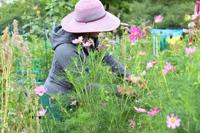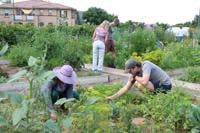
Community gardening has measurable physical, mental health benefits, CU Boulder study finds | Lifestyle
Community gardens can be a catalyst for healthier individuals, according to a study from the University of Colorado Boulder.
As the first randomized and controlled trial of community gardening, the study found measurable physical and mental health benefits that accompany gardening with others. Specifically, it found that individuals involved in community gardens increased their fiber intake, got more physical activity and reduced stress.
“We felt like with this trial, it gave us very good evidence that hasn’t existed before — showing that community-based intervention like gardens can be beneficial for public health and well-being,” said senior author Jill Litt, a professor in the university’s Department of Environmental Studies.
Community-based intervention such as gardens can be beneficial for public health and well-being, a study found.
Funded by the American Cancer Society, Litt worked with Denver Urban Gardens and recruited 291 nongardening adults, with an average age of 41, from the Denver area. More than a third were Hispanic and more than half came from low-income households.
“A lot of the gardens are located in very low-income areas or kind of right on the edge, and so they’re really meant to serve people who need the most,” Litt said.
Half of those recruited were assigned to a community gardening group and half to a control group that was asked to wait one year to start gardening.
The gardening group received a free community garden plot, some seeds and seedlings, and an introductory gardening course.
“We were looking for new gardeners,” Litt said. “We wanted to see if gardens changed behavior, but we also wanted to know if it could work for people new to it.”
Throughout the study, the gardening group and the nongardening group took periodic surveys about their nutritional intake and mental health, underwent body measurements and wore activity monitors.
When the trial was over and it came time to look at the data, Litt found improved health indicators among the gardening group.
The Denver Urban Gardens provided plots for CU Boulder to study the impact of community gardening on health. The study found that individuals involved in community gardens increased their fiber intake, got more physical activity and reduced stress.
“We saw that gardening basically did change behavior,” she said. “It was like a ripple effect. People go to it because they just want to do something they love and so it’s not about health.”
Your weekly local update on arts, entertainment, and life in Colorado Springs! Delivered every Thursday to your inbox.
Success! Thank you for subscribing to our newsletter.
The study found that the gardening group increased their physical activity levels by about 42 minutes per week with just two to three visits to the community garden weekly.
“It increased moderate to vigorous physical activity, which is really good news for cancer prevention. It’s one of the key factors that you want to start to change if you want to reduce your risk,” Litt said.
Those in the garden also began to eat more fiber, about 1.4 grams more per day than the control group.
“We saw a 7% difference between those who were in the garden versus not, which is also really good news because fiber intake is quite low,” Litt said. “Fiber is very important as a diet marker for health and preventing diseases like cancer and chronic disease.”
Another area of improvement: mental health. Participants in the garden recorded reduced levels of stress and anxiety.
“It was more significant for those who came into the study with higher levels of stress,” Litt said. “If you can start to refine ways to reduce people’s stress and anxiety, you put them on a much better path for health. Stress and anxiety is not only a concern for mental health, but it’s also a concern for physical health.”
The community aspect of the garden also seemed to impact the participants. “It fosters connection across the generations, which is really important for creating strong communities and cohesion at the community level,” Litt said.
The Denver Urban Gardens provided plots for CU Boulder to study the impact of community gardening on health. The study found that individuals involved in community gardens increased their fiber intake, got more physical activity and reduced stress.
“Gardens are one example where people really relate to the space and value it as an asset in their neighborhoods. The other thing that we’ve seen just in past research is that it’s a place to resolve conflict.”
As far as the long term, the study found that about 75% of the gardening participants continued gardening after the first year. “That to me suggested that this is something that’s sticking for people, that they liked doing it,” Litt said. “Others who left the garden, they didn’t stop gardening. They started gardening at home.”
Overall, Litt hopes to see more people become involved in community gardens as a way to improve health and prevent health complications.
“What we hope to see down the road is as people continue this, they start to make more significant changes in their lives,” she said. “You have a social organization, you’re spending time outdoors, you have contact with nature, like it has all these pieces and it exists in your community. So to me it became a model system to understand healthy places.”












